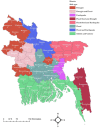Understanding climate-sensitive diseases in Bangladesh using systematic review and government data repository
- PMID: 40106483
- PMCID: PMC11922245
- DOI: 10.1371/journal.pone.0313031
Understanding climate-sensitive diseases in Bangladesh using systematic review and government data repository
Abstract
Background: Understanding the effects of climate change on health outcomes is crucial for effective policy formulation and intervention strategies. However, in Low- and Middle-Income Countries, like Bangladesh, the true extent of these effects remains unexplored due to data scarcity. This study aims to assess available evidence on climate change-related health outcomes in Bangladesh, to compare it with actual national occurrences, and to explore challenges related to climate change and health data.
Methods: We first conducted a systematic review to summarize the climate-sensitive diseases examined in existing literature in Bangladesh. The review results were then compared with over 2.8 million samples from the government's data repository, representing reported cases of climate-sensitive diseases during 2017-2022. This comparison aimed to identify discrepancies between the diseases currently occurring in Bangladesh related to climate change and available knowledge through existing research. Additionally, we also explored the limitations of the data recorded in the government data repository.
Results: The available literature in Bangladesh reports only a few specific climate-sensitive diseases, including Diarrhea, Dengue, Cholera, Malaria, Pneumonia, Cardiovascular Diseases, Hypertension, Urinary-Tract Infections, and Malnutrition, which were also considered in few studies. This represents a segment of the total 510 reported climate-sensitive diseases in Bangladesh, of which 143 diseases were responsible for 90.66% of the total occurrences. The most common forms of diseases were diarrhea and gastroenteritis of presumed infectious (28.51%), pneumonia (18.88%), anxiety disorders, panic disorders, generalized anxiety disorders (13.2%), and others (13.15%). Additionally, Urinary-Tract infections (7.87%), cholera (3.03%), and typhoid fever (3.27%) were other frequently reported climate-sensitive diseases. We also explored several challenges related to available data in the government repository, which include inadequate collection of patients' comprehensive socio-demographic information and the absence of a unique patient identifier.
Conclusion: The findings underscore the urgent need to tackle data challenges in understanding climate-sensitive diseases in Bangladesh. Policies and programs are required to prioritize the digitalization of the healthcare system and implement a unique patient identification number to facilitate accurate tracking and analysis of health data. Climate Change, including rising temperature and extreme weather events like cyclone and floods, poses a significant global health threat [1]. The World Health Organization estimates climate change already causes at least 150,000 deaths annually at the global level, and that number is projected to double by 2030. Beside these other impact of climate change are far-reaching, leading to forced displacement, malnutrition and increased incidence of diseases such as dengue, diarrhea, and pneumonia [2]. Additionally, climate change has established links to mental health issues, like anxiety and depression [3]. The effects are particularly severe in Low- and Middle-Income Countries (LMICs) due to limited resources and inadequate infrastructure for coping with erratic weather and disasters [4]. We undertook a comprehensive mixed-method study, incorporating a systematic review of existing studies conducted in Bangladesh, along with an analysis of government data repository. A detailed description of each component is presented below.
Copyright: © 2025 Kabir et al. This is an open access article distributed under the terms of the Creative Commons Attribution License, which permits unrestricted use, distribution, and reproduction in any medium, provided the original author and source are credited.
Conflict of interest statement
The authors have declared that no competing interests exist.
Figures



Similar articles
-
The 2023 Latin America report of the Lancet Countdown on health and climate change: the imperative for health-centred climate-resilient development.Lancet Reg Health Am. 2024 Apr 23;33:100746. doi: 10.1016/j.lana.2024.100746. eCollection 2024 May. Lancet Reg Health Am. 2024. PMID: 38800647 Free PMC article. Review.
-
The silent threat: Unveiling climate change's water and health challenges in Bangladesh.J Water Health. 2024 Nov;22(11):2094-2112. doi: 10.2166/wh.2024.349. Epub 2024 Oct 18. J Water Health. 2024. PMID: 39611671
-
Scoping review on assessing climate-sensitive health risks.BMC Public Health. 2025 Mar 7;25(1):914. doi: 10.1186/s12889-025-22148-x. BMC Public Health. 2025. PMID: 40055611 Free PMC article.
-
COVID-19 pandemic, dengue epidemic, and climate change vulnerability in Bangladesh: Scenario assessment for strategic management and policy implications.Environ Res. 2021 Jan;192:110303. doi: 10.1016/j.envres.2020.110303. Epub 2020 Oct 16. Environ Res. 2021. PMID: 33069704 Free PMC article.
-
Climate changes, environment and infection: facts, scenarios and growing awareness from the public health community within Europe.Anaerobe. 2011 Dec;17(6):337-40. doi: 10.1016/j.anaerobe.2011.05.016. Epub 2011 Jun 2. Anaerobe. 2011. PMID: 21664978
Cited by
-
The health impact of climate change on the women in reproductive age: a study of coastal communities in Satkhira, Bangladesh.Front Public Health. 2025 Jun 24;13:1560498. doi: 10.3389/fpubh.2025.1560498. eCollection 2025. Front Public Health. 2025. PMID: 40630409 Free PMC article.
References
-
- Parling I. Human Rights and Climate Change: Are States Violating the Right to Life by Not Cutting Emissions? The Swedish Institute of International Affairs.2021;(3): .
-
- Salm L, Nisbett N, Cramer L, Gillespie S, Thornton P. How climate change interacts with inequity to affect nutrition. Wiley Interdisciplinary Reviews: Climate Change. 2021;12(2):e696.
-
- Hallegatte S, Rozenberg J. Climate change through a poverty lens. Nature Clim Change. 2017;7(4):250–6. doi: 10.1038/nclimate3253 - DOI
-
- Al Amin M. Climate change. The Business Standard. 2021.
Publication types
MeSH terms
LinkOut - more resources
Full Text Sources
Medical

